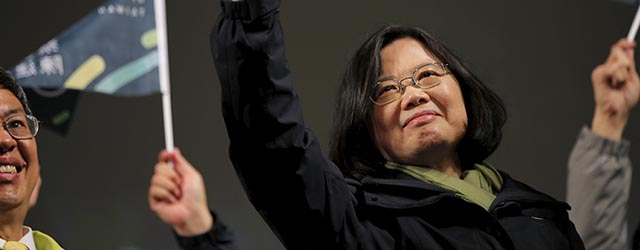Tsai Ing-wen, leader of what was—until a couple of weeks ago—Taiwan’s opposition party, will become the island’s first female president this spring following a January 16 election in which she and her Democratic Progressive Party (DPP) won control of both the presidency and the legislature from the incumbent Kuomintang (KMT) party.

The new legislature, which forms this month, will be the first in which the Kuomintang does not have majority control. Tsai, a former law professor, will take office in May.
Chief among the campaign issues was Taiwan’s complex relationship with mainland China, which claims Taiwan as its own territory. Outgoing president Ma Ying-jeou signed multiple trade and investment agreements with Beijing during his eight years in office and met with current Chinese president Xi Jinping in November. Mainland China and Hong Kong now account for 39% of Taiwan’s exports and 19.9% of its imports. More than 40% of tourists to Taiwan are from the mainland.
Critics of the KMT charge that this close economic relationship has disproportionately benefited the wealthy and made the Taiwanese economy overly dependent on mainland China. This sentiment benefited the DPP, which advocates political independence for Taiwan. But the new government will likely avoid confrontation with Beijing and instead focus on reviving the domestic economy.
“In policy terms, I do not expect the DPP’s success to translate into a more hostile attitude toward China, [but] rather less emphasis on relations with the mainland, a renewed attempt to build Taiwan’s international relations, and more attention domestically to social policy issues,” says Michael Reilly, a senior fellow at the China Policy Institute at the University of Nottingham.
To boost the economy, Tsai and the DPP will likely introduce stimulus measures encouraging education and innovation. But, says Reilly, the challenges are deeper.
“The real problem for Taiwan, and therefore for Tsai,” he explains, “is that it has deep-seated structural issues that successive governments have failed to tackle and which must be addressed if Taiwan is to get back on the path of long-term sustainable growth.”
Tsai must reform the state sector, reduce bureaucracy and offer economic incentives to encourage Taiwanese companies operating in mainland China to manufacture in Taiwan instead. To remain competitive, these companies must evolve beyond high-volume, low-cost contract technology and manufacturing to create internationally recognized brands.



